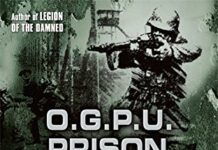
Ebook Info
- Published: 2010
- Number of pages: 256 pages
- Format: Epub
- File Size: 0.22 MB
- Authors: Sven Hassel
Description
Convicted of deserting the German army, Sven Hassel is sent to a penal regiment on the Russian Front. He and his comrades are regarded as expendable, cannon fodder in the battle against the implacable Red Army. Outnumbered and outgunned, they fight their way across the frozen steppe…
This iconic anti-war novel is a testament to the atrocities suffered by the lone soldier in the fight for survival.
Sven Hassel’s unflinching narrative is based on his own experiences in the German Army. He began writing his first novel, LEGION OF THE DAMNED in a prisoner of war camp at the end of the Second World War.
User’s Reviews
Review An extraordinary book, which has captured the attention of all of Europe―NEW YORK TIMESHassel’s books of war are the most powerful I have ever readIn essence this is an expose of the absurdity of war, and a moving plea for peace. As such, it takes its rank with far milder books, such as ALL QUIET ON THE WESTERN FRONT―NEWSDAYThe story shudders from page to page while the devoted friends live precariously from year to year, until only the one survivor is left to write this book. And a gripping book it is―CHICAGO SUNDAY TRIBUNE –This text refers to the paperback edition.
Reviews from Amazon users, collected at the time the book is getting published on UniedVRG. It can be related to shiping or paper quality instead of the book content:
⭐ Supposedly based on the author’s experiences this is the first of a series of novels and most likely the closest to the truth, if that matters. It is by turns funny and fearsome not for the squeamish, as soldiers live close to sex and death all the time in Hassel’s stories. This is a juvenile pleasure, a remembrance of times past, of reading under the covers in bed, slipping out of class to read “trash.” In between more ponderous reads I plan to read the whole series again and be glad I missed the misery and gore and high adventure of World War Two. Hassel’s war netted him a fortune and us a series of modern cowboy adventure stories. If you can accept the premise of comradeship even among Germans in that conflict you can marvel at this comic book style of story telling. Otherwise keep well away. Even as a convict in that fight, it’s hard to accept in the real world that anyone could support Hassel’s side coming out on top. He fought hard for the Germany that put him in prison then took him out of his cell and gave him a tank to drive through Hitler’s enemies! He says it was to save his own skin but it was not to save those of Nazism’s victims. You have been warned!
⭐ The question of whether Sven Hassel’s “Legion of the Damned” is a memoir, an oral history posing as a memoir, or outright fiction has persisted for decades. The rough style and breaks in narrative, along with incidents so strange they’d be hard to make up, the relative concentration on everything but combat, and even the simplistic but presumably hard-earned politics give the book an air of authenticity. If it’s an imitation, it’s a good one.I have a theory about Hassel’s books. It has the feel of common sense and the advantage of there being very few facts to complicate or counter it. I suspect that Hassel wrote the memoir he’d promised his comrades with no idea of how popular it would become. Its success led to sequels while a growing confidence in his writing (or that of his wife, rumored to be his ghostwriter) led to his elaborating on incidents from the first book, telling tales he knew only at second- or third-hand, and using compression, elaboration, rearrangement and other techniques of fiction. More than anything else, it was the appearance of sequels and the growing sophistication of the writing that sparked questions about Hassel’s memoirs being what they claim.Whatever the truth, “Legion” is exciting, depressing, and often shocking. In style and content, it’s a cross between “The Devil’s Guard” and “Papillion,” two other wildly popular and fascinating memoirs of uncertain legitimacy. Mentioning the latter book reminds me of its sequel, “Banco,” a tale of misadventure lacking only “Papillion’s” poignancy. It seems largely forgotten, but it shouldn’t be. Read “Legion of the Damned” and hunt down “Banco.”
⭐ Hassel writes a believable first person fictional history of a WW-II Werhmacht soldier. I had a good friend who was a German soldier in WW-II who described the day he was captured at Alamein as the happiest day of his life. Hassel’s character is not inconsistent with my friend’s history. Hassel’s character describes the horrors of war and the horror that he became as a member of the Legion of the Damned. While there is some controversy with respect to Hassel’s WW-II stories this book reads to me as an unapologetic confessional of a young man caught up in the horrors of an impossible situation.
⭐ I first came across and bought this book at a book store in Grand Central Station, NY in a paperback edition back in 1964 and was instantly HOOKED. I have since read all of Hassel’s books which are all great and highly recommended but, in my opinion, this was the best one (it is also #1 in his wonderful series).Like all great historical fiction it must be (1) believable and (2) accurate as to the background (i.e.: weapons used, food eaten, attitudes, etc.) Hassel, who was there, apparently fictionalized his wartime experiences and did it magnificently. If this book was not written from the German side of WWII it would have been a blockbuster movie at the very least and considering the additional books in the series (all highly recommended) a movie dynasty.
⭐ I discovered Sven Hassle my senior year of high school with his book “Wheels of Terror”. I find his writing to be very accurate, descriptive, and on point of his themes presented in his writing. He does not write with historical accuracy and his timelines leave something to be desired.He writes with excitement and holds the reader’s attention as he brings alive just how horrible, sad, terrorizing, and disgusting war is. Along with the killing, torture, and mass murders all results of prejudice, propaganda, totalitarianism, and hate. I highly recommend this book and all other books by Mr. Hassle.
⭐ LEGION OF THE DAMNED, the first, most famous and ostensibly most autobiographical of Sven Hassel’s fourteen World War II novels, doesn’t really qualify as the start of a series. While Hassel himself serves as the narrator of all of his works, and many characters introduced here do indeed reappear in most or all of his subsequent books, the relationship between LEGION and the (more genuine) series of stories which followed it is only tangential. For one thing, most of the aforementioned characters have died in battle by the time LEGION reaches its harrowing – and, in my own opinion, beautifully written – final pages, in effect rising from the grave to take up their roles in Hassel’s later books. The tone of LEGION is likewise more somber, more sorrowful and far more intensely bitter than that of any of its “sequels,” dark as they frequently are. The lingering question of just who Sven Hassel is/was, and what if anything he did as a Danish Wehrmacht soldier during the Second World War, constitutes an intriguing mystery in its own right; but for the moment I’ll take the man at blurb-value and assume that his alleged experiences in a penal battalion (to which he was sent after deserting the regular German army in 1939) are more or less genuine. He certainly crafts a hell of a story, regardless: LEGION and all of his subsequent books offer up an admixture of nauseous violence, slapstick humor, disillusioned nihilism and earnest longing which makes the Hollywood concept of “The Good War” look as silly, simple and manipulative as it really is. LEGION probably accomplishes this best, as the later books do tend to give their primary group of characters a sort of bulletproof, swashbuckling veneer which frequently undermines the quality of the stories themselves. All of Hassel’s books follow a set structural pattern: brief snippets of real-life wartime horror, running from a few lines to several pages, precede each chapter and are often (though not always) expanded and/or commented upon in fictional form therein. The characters – Hassel himself, the Old Man (Hassel’s sergeant) and Porta (the rogue soldier), plus later additions like Tiny (the simpleminded giant), Heide (the Nazi) and the Legionnaire (no explanation necessary), kill vast numbers of people, steal and consume huge quantities of goods and ruminate over their luckless lot and the disgraceful politics which have brought them to it. It sounds formulaic, and indeed can get repetitive after a while; but there’s no denying the profound power of the cumulative effect. What is perhaps most refreshing and impressive about Hassel’s books is the fact that he utilizes a group of Wehrmacht soldiers not as the fulcrum for yet another tired exposition of the evils of Nazism, but for an anlysis of the far greater and vaster evil of war itself – all war, at all times, in all places. To be sure, these men aren’t heroes, nor even antiheroes in the sense we’ve come to recognize. They kill, spare and joke with equal ease, make life hellish even for one another and are always on the lookout for the least bit of gain. Much of their behavior, of course, is excusable in its context, but not all of it. As a result, we are left to contemplate the full complexity of war, and by extension the full complexity of man, as our ostensible protagonists alternately touch, amuse and repel us. This is a powerful experience, and if it doesn’t always make for great literature it certainly never sinks to the level of potboilers. LEGION OF THE DAMNED is ultimately about more than its author’s identity or past, and should be read for what it has to offer as a book independent of war-buff minutiae. Those who appreciate its admittedly rough-edged message are advised to seek out other Sven Hassel novels for what is, I can assure you, one hell of a ride through the battlefield. Sehr gut!
⭐ I read all of the Sven Hassel books way back in the early 80’s. I thought I would revisit them, as they are available as digital versions. They are still a good, if a little lightweight, read – even after all these years,Easy to read and get through reasonably quickly (I think my reading ability has vastly improved and sped up since I was 19 or 20 years old).I wouldn’t take the entire story at face value, I would say that after the first book or two in the series that the author has taken some artistic license with the internal details and absolute historians would quibble over some of the scenarios.Don’t let that put you off though; they are a great snapshot of the terrible time the world found itself in WW2, as well as an insight into the brutality of war and the obscene regime of the Nazi’s.The book and the series would suit young men 18 years and over. The style and format lends itself well to start those who are not readers off and, hopefully, develop a thirst for more, and more complex, reads.
⭐ I originally read this book back in the mid ’70s while I was in the Navy cruising around the Mediterranean Ocean. Just thought I’d give it another look without having the actual book sitting on a shelf this time.Sven Hassel’s books aren’t for the squeamish, but they are about war, so what can I say? You either like them, or you don’t. I happened to like them… forty years ago.
⭐ Sven Hassel books are not well known in the USA but they are very popular in Europe because they give you a good understanding of the German ordinary soldier in WWII. Most of the movies/books paint a very despicable picture of a German soldier. Sven Hassel was a soldier in the German army and all his books are very real. The truth is that most of the German soldier enlisted because it was the only way a poor person will get food, housing and clothing during the economical distress of 1930’s Germany. Most of the German soldier were terrified of the German secret police and the consequences of raising their voices against Hitler. A great book if you are interested in some realistic history novels.
⭐ The book is a riveting account from the inside of the Nazi war machine. It starts with the author’s hellish life in a concentration camp and moves on to life in a penal unit. The two are not easy to read, but they do grab the reader’s attention.The Germans (or at least the ones in this book) are not the standard psychopath/murderer SS men we see in movies. They are human beings caught between a rock and a hard place. Many of them hate Hitler, his regime and his ideology. And yet, most choose to fight in his armies nevertheless. Whether that makes them more despicable than the SS men who truly did believe in what they were doing, I leave the reader to decide. Whatever one thinks about their moral choices, one has to admit that their situation was tragic.The only thing I can reproach the author is the lack of information about certain characters and events. Human life, unlike fiction, does not follow a neat thread where there is a clear beginning, middle and end and all the questions are answered by the last chapter. The story does lack coherency, but this is not really a story per se but a recollection of experiences in a penal unit, so I don’t mind. However, more information could be given about some people and events.For example, the author talks about his relationship with Ursula, who was a great love of his life. He introduces her suddenly and without warning. By the time we meet her, the two are already lovers.How did a private from a penal unit meet this women and how did their relationship came to be?Then he talks about his captivity in Soviet Union and in a throwaway line mentions that he met a woman there who almost made him forget about Ursuala. Nothing is said about that relationship.When Porta, a character second in importance to the author, dies, we are told nothing about circumstances surrounding his demise. But when Big Un dies, we get a long description.Also, the story starts and ends suddenly, as if someone cut part of the film at the beginning and at the end. How did the author get join the army and why. How did the war end for him?Was it really that difficult to provide this information, even if sparingly?Despite those lacks, the story is powerful and fascinating. I recommend this book.
Keywords
Free Download Legion of the Damned in Epub format
Legion of the Damned Epub Free Download
Download Legion of the Damned 2010 Epub Free
Legion of the Damned 2010 Epub Free Download
Download Legion of the Damned Epub
Free Download Ebook Legion of the Damned





